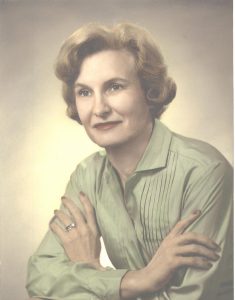
Mission
The Writer-in-Residence Program’s mission is to increase awareness of the core values and body of work of Wilma Dykeman and to contribute to local, regional, and national conversations with original works of fiction, non-fiction, and other media which center around the causes Wilma spent her life supporting. Ultimately, the program will strive to increase the footprint and impact of UNC Asheville and one of its most accomplished alumni.
Wilma Dykeman’s Life and Work
Wilma Dykeman was an extraordinary writer, speaker, activist and teacher. Born near Asheville, North Carolina, she became a groundbreaking environmentalist, a pioneering civil rights reporter, a best-selling author, a founder of Appalachian Studies, and a beloved daughter, wife, and mother. Her accomplishments and awards included a Guggenheim Fellowship, the Sidney Hillman Award, the first woman trustee of Berea College, a Senior Fellow of the National Endowment for the Humanities, the first woman Tennessee State Historian, membership in the North Carolina Literary Hall of Fame, and membership in the Fellowship of Southern Writers.
Wilma was born and raised in Lynn Cove at the head of the Beaverdam Valley just north of Asheville. Her father, Willard Jerome Dykeman, was a retired dairy farmer from upstate New York, and her mother, Bonnie Cole Dykeman, was a homemaker and daughter of a timberman. She attended Grace Elementary School, Grace High School, and Biltmore Junior College, which would later become the University of North Carolina Asheville.
Wilma trained at Northwestern University to be an actress. She lined up a post-graduation job in Manhattan as the initial faculty member of The Finch School’s new broadcasting department, but instead she married Tennessean James Stokely and found herself a thousand miles from Broadway, in Newport Tennessee, where they had two sons.
Wilma wrote short stories, radio programs, book reviews, and a memoir while her husband grew apples. In The French Broad, she published her argument that environmental sensitivity can encourage broad-based economic development. She and her husband James reported on civil rights for the New York Times and published the award-winning Neither Black Nor White.
At the height of her career, she published three novels, including the Southern mountain classic The Tall Woman. She also led workshops on Appalachian history and literature throughout the region and wrote a popular and influential weekly column for The Knoxville News-Sentinel. She taught Appalachian literature and creative writing at the University of Tennessee for two decades and secured funding from the Andrew Mellon Foundation for one of the nation’s first summer institutes for high school teachers. While serving on the committee to rename the Tennessee Oilers football team, she suggested the name that was ultimately chosen – the Tennessee Titans.
In 2006, Wilma died from complications following hip surgery. Her essence – a life devoted to her core values – lives on through the Wilma Dykeman Legacy and the Wilma Dykeman Writer-in-Residence program.
Partnership
The Wilma Dykeman Writer-in-Residence is a collaboration between the University of North Carolina Asheville and the Wilma Dykeman Legacy, a non-profit organization founded in 2012 to honor Wilma Dykeman’s extraordinary life, and to sustain her core values of environmental integrity, social justice, and the power of the written and spoken word.
Contact
If you have questions or need additional information, please contact us at wir@unca.edu.

